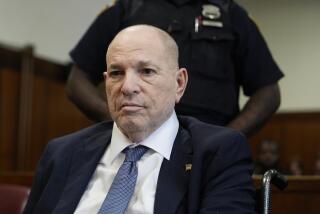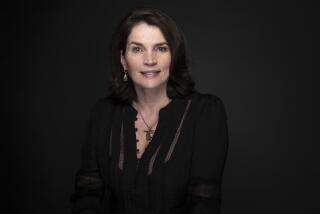Harvey Weinstein sentenced to 16 years in prison for Los Angeles rape

- Share via
Harvey Weinstein was sentenced to 16 years in prison Thursday for raping a woman in a Beverly Hills hotel in 2013, all but ensuring that the disgraced Hollywood kingmaker will spend the rest of his life behind bars.
Weinstein, who is 70 and in poor health, is already serving a 23-year prison sentence in New York, where he was convicted in 2020 of sexually assaulting other women.
In handing down Weinstein’s punishment, Los Angeles County Superior Court Judge Lisa Lench ruled he cannot serve the two sentences concurrently.
Instead, Weinstein will return to New York to serve out the rest of his sentence there, according to his attorney, Mark Werksman. Combined, the sentences ensure Weinstein will not be eligible for release until at least the 2050s.
Following a nearly two-month trial, Weinstein was convicted last month of raping an Italian model and actor after he barged into her hotel room. A jury deliberated for 10 days before convicting him of forcible rape, forcible oral copulation and sexual penetration with a foreign object in connection with the assault of the woman, who was not named during the trial.
The woman, identified as Jane Doe 1, trembled and cried while speaking in court Thursday and asked Lench to hand down the most severe punishment possible. Weinstein’s behavior, she said, robbed her of control of her life and has left her to endure flashbacks of the assault to this day.
“There is no prison sentence long enough to erase the damage. ... He deserves to experience the same shame, humiliation and fear as I did,” she said.
Weinstein faced a maximum sentence of 24 years in prison. Prosecutors asked Lench to hand down the maximum sentence.
Werksman asked that Lench sentence Weinstein to just three years in prison, to be served concurrent with his New York sentence, because all of the counts related to one sexual act that happened in a “frenzied” 15-minute span. He also requested leniency because of Weinstein’s myriad health issues, including spinal stenosis and diabetes.
Lench, however, ruled that each count was a distinct crime and sentenced him to eight, six and two years in prison for each count, respectively.
Weinstein spoke for the first time since his trial began in October, maintaining his innocence and asking Lench not to hand down what was effectively a life sentence.
“I did not rape this woman. I did not see this woman. I wasn’t at the hotel,” Weinstein said.
He claimed his accuser, as a former actor, knew how to “turn the tears on” and said the woman’s allegation was the result of a “cottage industry” of lawyers who have made careers out of suing him. Jane Doe 1 filed a civil suit against Weinstein shortly after he was convicted.
Weinstein initially faced more than 11 counts of sexual assault stemming from allegations he raped and groped multiple women in hotel rooms in Los Angeles and Beverly Hills from 2004 to 2013.
Jurors deadlocked on charges based on his alleged attacks on three other women, including Jennifer Siebel Newsom, who is married to Gov. Gavin Newsom. And prosecutors dropped counts related to allegations made by a fourth woman, who did not appear in court to testify.
Siebel Newsom released a video statement after the hearing. In it, she recounted other incidents of abuse she said she had suffered and the trauma of losing her sister as a young child, but said “what Harvey Weinstein did to me was the worst. His assault was excruciatingly traumatic. And for years, he walked away unfettered while I spent years nursing my wounds.”
Dist. Atty. George Gascón’s office has not said whether it will seek to retry Weinstein on the counts for which the jury could not reach a verdict.
The mogul has denied all wrongdoing and is appealing his New York conviction, though an earlier attempt to do so failed. While he spoke at his sentencing hearing in New York, Weinstein did not testify in his own defense at either trial.
Thursday’s hearing was another, and possibly final, turn in Weinstein’s complete fall from Hollywood’s highest echelon. The onetime film producer who was the force behind beloved films such as “The English Patient” and “Good Will Hunting” is now a pariah in the industry he once ruled.
Weinstein’s career unraveled in 2017, after investigations by the New York Times and the New Yorker revealed he had used his status in the industry to get access to actors and models, many of whom said he abused and in some cases raped.
In all, dozens of women have accused Weinstein of sexual misconduct.
Prosecutors focused on that dynamic throughout the trial, painting Weinstein as a predator who used Hollywood as his hunting ground and specifically targeted women whom he could use his influence to silence.
“For this predator, hotels were his trap. Confined within those walls, victims were not able to run from his hulking mass. People were not able to hear their scream,” L.A. County Deputy Dist. Atty. Marlene Martinez said during her closing argument last month.
Weinstein’s defense team aggressively attacked each woman’s credibility, arguing that some of the accusers had fabricated their encounters with Weinstein and that others had engaged in consensual sexual relationships with him in exchange for job opportunities.
Defense attorney Alan Jackson pleaded with jurors to focus on what he said were inconsistencies in the women’s claims, as opposed to their emotional testimony.
“I don’t know how to say it more gentle than this, but fury does not make fact,” he said. “Tears do not make truth.”
More to Read
Sign up for Essential California
The most important California stories and recommendations in your inbox every morning.
You may occasionally receive promotional content from the Los Angeles Times.










